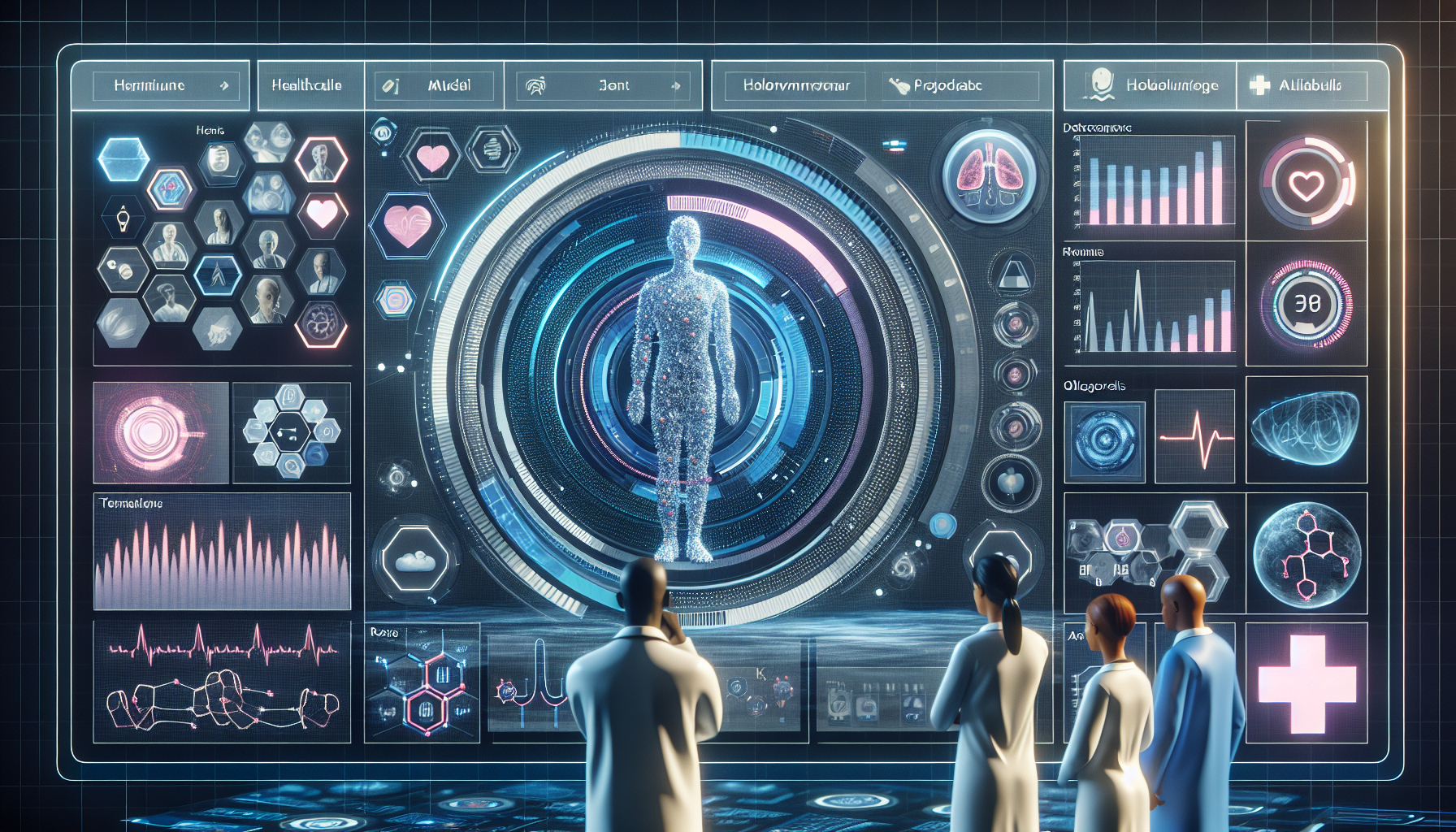AI Technology in Healthcare: Predicting Chronic Illness Risks

Leveraging AI to Enhance Early Detection of Chronic Diseases
AI Technology in Healthcare: Predicting Chronic Illness Risks
In the realm of healthcare, the advent of Artificial Intelligence (AI) has heralded a new era of possibilities, particularly in the early detection and management of chronic diseases. This transformative technology, through its ability to analyze vast datasets and uncover patterns invisible to the human eye, is revolutionizing how medical professionals approach the prediction and prevention of chronic illnesses. By leveraging AI, healthcare providers can now enhance their diagnostic capabilities, offering a beacon of hope for millions of individuals at risk of developing long-term health conditions.
The journey into the utilization of AI in predicting chronic illness risks begins with the collection and analysis of patient data. AI systems, equipped with sophisticated algorithms, sift through extensive health records, genetic information, and lifestyle data to identify risk factors associated with chronic diseases such as diabetes, heart disease, and cancer. This process, which would take humans an impractical amount of time to complete, is accomplished by AI in a fraction of the time, with a level of precision that is truly remarkable.
Moreover, AI’s predictive analytics extend beyond traditional risk factors, incorporating emerging data sources such as wearable technology. These devices, which monitor everything from heart rate to sleep patterns, provide a continuous stream of health data that AI systems can analyze in real-time. This capability allows for the identification of subtle changes in an individual’s health status, potentially signaling the early stages of a chronic condition long before conventional diagnostic methods would detect it.
Transitioning from detection to intervention, AI also plays a pivotal role in the development of personalized treatment plans. By understanding the unique risk factors and health profiles of individuals, AI can assist healthcare providers in crafting targeted interventions that are more likely to be effective. This personalized approach not only improves patient outcomes but also contributes to the overall efficiency of healthcare systems by preventing the progression of chronic diseases and reducing the need for costly treatments.
Furthermore, AI’s impact on predicting chronic illness risks is not confined to individual patient care. On a broader scale, public health initiatives benefit from AI’s predictive capabilities, enabling policymakers to identify at-risk populations and implement preventative measures on a community or even national level. This proactive approach to healthcare, powered by AI, has the potential to significantly reduce the incidence of chronic diseases, alleviating the burden on healthcare systems worldwide.
In conclusion, the integration of AI technology into healthcare represents a significant leap forward in the fight against chronic diseases. By enhancing the early detection of illness risks, AI not only empowers healthcare providers but also offers patients a chance at a healthier future. As this technology continues to evolve and become more sophisticated, its role in predicting and managing chronic illnesses is expected to grow, marking a new chapter in the ongoing quest to improve human health. The promise of AI in healthcare is vast, and its full potential is just beginning to be realized. As we move forward, it is clear that AI will be at the forefront of transforming healthcare, making the early detection and prevention of chronic diseases more accessible and effective than ever before.
The Role of Machine Learning in Predicting Patient Risk for Chronic Illnesses

AI Technology in Healthcare: Predicting Chronic Illness Risks
The integration of Artificial Intelligence (AI) technology into the healthcare sector has been a game-changer in predicting and managing chronic illnesses. With the advent of sophisticated machine learning algorithms, healthcare professionals can now anticipate the risk of chronic diseases in patients with unprecedented accuracy. This predictive capability is not just a technological triumph but a beacon of hope for millions worldwide, potentially revolutionizing the way chronic illnesses are approached and treated.
Machine learning, a subset of AI, employs statistical methods to enable computers to learn from and make predictions or decisions based on data. In the context of healthcare, this means analyzing vast amounts of patient data to identify patterns or risk factors associated with chronic diseases. The beauty of machine learning lies in its ability to sift through complex, multifaceted data sets – from genetic information to lifestyle factors – and discern risk factors that are often subtle and multifactorial, thus eluding traditional analysis.
The predictive power of machine learning in healthcare is particularly potent when it comes to chronic illnesses such as diabetes, heart disease, and cancer, which are leading causes of death globally. By leveraging machine learning algorithms, healthcare providers can predict which patients are at higher risk of developing these conditions. This is achieved by analyzing various indicators, including but not limited to, medical history, genetic predispositions, environmental factors, and even seemingly unrelated data points that the algorithm identifies as relevant. Consequently, this predictive insight allows for early intervention strategies that can significantly alter a patient’s health trajectory.
Moreover, the role of machine learning in predicting patient risk for chronic illnesses extends beyond individual patient care. It also has profound implications for public health strategies. By identifying population-level risk factors and trends, healthcare systems can develop targeted prevention and education campaigns, allocate resources more efficiently, and ultimately, reduce the incidence of chronic diseases.
However, the implementation of AI and machine learning in healthcare does not come without challenges. Issues such as data privacy, the need for large and diverse datasets to train algorithms, and the potential for algorithmic bias must be carefully navigated. Despite these challenges, the potential benefits of AI in predicting chronic illness risks are too significant to ignore.
Furthermore, as machine learning algorithms become more sophisticated and healthcare data becomes more accessible, the accuracy and utility of these predictive tools are expected to improve. This progress promises not only to enhance the quality of care for individuals but also to contribute to a healthier society overall.
In conclusion, the role of machine learning in predicting patient risk for chronic illnesses represents a pivotal shift in healthcare. By harnessing the power of AI, healthcare professionals can now predict and prevent chronic diseases with a level of precision that was previously unimaginable. This technological advancement offers a brighter, healthier future, underscoring the importance of continued investment and research in AI technologies within the healthcare sector. As we move forward, the integration of AI in healthcare holds the promise of transforming the landscape of chronic disease management, marking a significant step forward in our quest for a healthier world.
Innovations in AI: Transforming Chronic Disease Management and Prevention
In the realm of healthcare, the advent of Artificial Intelligence (AI) technology has marked a new era of innovation, particularly in the management and prevention of chronic illnesses. This transformative technology is not only reshaping how healthcare providers approach treatment but also empowering them with predictive capabilities that were once thought to be within the realm of science fiction. As we delve into the intricacies of AI’s role in healthcare, it becomes evident that its impact on predicting chronic illness risks is both profound and multifaceted, heralding a future where personalized medicine and proactive healthcare strategies become the norm.
AI technology, through its ability to analyze vast datasets far beyond human capability, is at the forefront of identifying patterns and risk factors associated with chronic diseases. Machine learning algorithms, a subset of AI, are particularly adept at sifting through electronic health records, genetic information, and lifestyle data to pinpoint individuals at higher risk of developing conditions such as diabetes, heart disease, and cancer. This predictive prowess is not merely about identifying risk; it’s about opening a window for early intervention that can significantly alter a patient’s health trajectory.
Moreover, AI’s predictive analytics extend beyond individual risk assessment to encompass population health management. By analyzing data from a wide array of sources, AI can identify trends and potential outbreaks of chronic illnesses within specific communities or demographics. This capability allows for targeted public health initiatives and resource allocation, ensuring that prevention efforts are directed where they are most needed. In this way, AI acts as a powerful tool in the fight against the rising tide of chronic diseases, offering a proactive rather than reactive approach to healthcare.
The integration of AI into healthcare also brings to light the potential for personalized medicine. By understanding the unique risk factors and health profiles of individuals, healthcare providers can tailor prevention and treatment plans to the individual, optimizing outcomes and enhancing the quality of life. This level of personalization, powered by AI’s analytical capabilities, represents a significant shift from the one-size-fits-all approach that has traditionally characterized much of healthcare.
However, the journey towards fully realizing AI’s potential in predicting chronic illness risks is not without challenges. Issues such as data privacy, ethical considerations, and the need for robust, unbiased datasets are critical hurdles that must be addressed. Ensuring that AI systems are transparent, accountable, and equitable is paramount to their successful implementation in healthcare settings.
As we look to the future, the role of AI in healthcare is poised for exponential growth. The ongoing advancements in AI technology promise not only to enhance its predictive capabilities but also to broaden its application across various aspects of healthcare. From drug discovery and development to patient monitoring and care coordination, AI is set to revolutionize the healthcare landscape.
In conclusion, AI technology’s role in predicting chronic illness risks is a testament to the transformative power of innovation in healthcare. By harnessing the capabilities of AI, healthcare providers can move towards a more proactive, personalized, and efficient approach to managing and preventing chronic diseases. As we continue to navigate the complexities of integrating AI into healthcare, the potential for improved patient outcomes and a healthier future for all remains a compelling vision that drives progress in this exciting field.